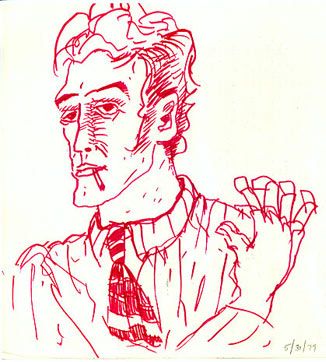 to the left a self portrait of Leonard Michaels In the recently released book of essays there's a story that mentions two Knickerbocker Village neighbors of Leonard Michaels, Lynn Nations and Arthur Kleinman. Leonard lived in the L Building, 20 Monroe Street. An excerpt from My Yiddish
to the left a self portrait of Leonard Michaels In the recently released book of essays there's a story that mentions two Knickerbocker Village neighbors of Leonard Michaels, Lynn Nations and Arthur Kleinman. Leonard lived in the L Building, 20 Monroe Street. An excerpt from My YiddishWhen I was five years old, I started school in a huge gloomy Vic-torian building where nobody spoke Yiddish. It was across the street from Knickerbocker Village, the project in which I lived. To cross that street meant going from love to hell. I said nothing in the classroom and sat apart and alone, and tried to avoid the teacher’s evil eye. Eventually, she decided that I was a moron, and wrote a letter to my parents saying I would be transferred to the "ungraded class" where I would be happier and could play ping-pong all day. My mother couldn’t read the letter so she showed it to our neighbor, a woman from Texas named Lynn Nations. A real American, she boasted of Indian blood, though she was blond and had the cheekbones, figure, and fragility of a fashion model. She would ask us to look at the insides of her teeth, and see how they were cupped. To Lynn this proved descent from original Americans. She was very fond of me, though we had no conversation, and I spent hours in her apartment looking at her art books and eating forbidden foods. I could speak to her husband, Arthur Kleinman, yet another furrier, and a lefty union activist, who knew Yiddish.
Lynn believed I was brighter than a moron and went to the school principal, which my mother would never have dared to do, and demanded an intelligence test for me. Impressed by her Katharine Hepburn looks, the principal arranged for a school psychologist to test me. Afterwards, I was advanced to a grade beyond my age with several other kids, among them a boy named Bonfiglio and a girl named Estervez. I remember their names because we were seated according to our IQ scores. Behind Bonfiglio and Estervez was me, a kid who couldn’t even ask permission to go the bathroom. In the higher grade I had to read and write and speak English. It happened virtually overnight so I must have known more than I knew. When I asked my mother about this she said, “Sure you knew English. You learned from trucks.” She meant: while lying in my sickbed I would look out the window at trucks passing in the street; studying the words written on their sides, I taught myself English. Unfortunately, high fevers burned away most of my brain, so I now find it impossible to learn a language from trucks. A child learns any language at incredible speed. Again, in a metaphorical sense, Yiddish is the language of children wandering for a thousand years in a nightmare, assimilating languages to no avail.
I remember the black shining print of my first textbook, and my fearful uncertainty as the meanings came with all their exotic Englishness and de-voured what had previously inhered in my Yiddish. Something remained indigestible. What it is can be suggested, in a Yiddish style, by contrast with English. A line from a poem by Wallace Stevens, which I have discussed elsewhere, seems to me quintessentially goyish, or antithetical to Yiddish:
I wrote to Leonard Michael's sister Carol to ask about Lynn Nations and Arthur Kleinman. I knew by checking SSDI records that they had passed. I wondered if they had offspring. They seemed like wonderful people. In another part of the story above Lynn encourages Leonard to go back to the playground to confront some bully tormentors who constantly teased him for his language problems.
From Carol:
Actually, they did not have any children, that's why they kind of adopted all of us kids. Their apartment was next door to ours. Since Arthur was Jewish he could speak to my parents in Yiddish which bridged the gap. Lynn was incredible, a real presence.


























No comments:
Post a Comment